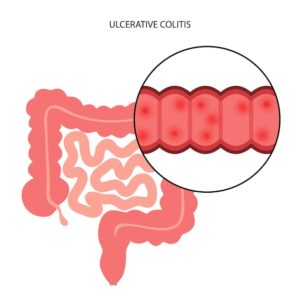
The colon, or digestive organ, is the fundamental site of irritation in ulcerative colitis (UC), a persistent provocative sickness. It is a kind of fiery gut infection (IBD) that can significantly affect everyday living and make constant inconvenience. However, people can better manage this ailment if they are aware of its causes, symptoms, and important variables.
What is Ulcerative Colitis(UC)?
Ulcerative colitis (UC) is a chronic disease that results in inflammation and ulcers within the colon (large intestine). Ulcerative colitis (UC) is a prevalent form of inflammatory bowel disease (IBD), along with Crohn’s disease. UC commonly results in bloody stool and stomach pain. It could increase the frequency of bowel movements. Many people with UC go through episodes of symptoms (flare-ups) alternated with extended periods of no symptoms (remission).
UC may impact anyone at any age, but it is most frequently identified in those between the ages of 15 and 30, with another episode occurring around age 60. Although there is no cure, there are ways to control the symptoms and lessen inflammation.
Causes of Ulcerative Colitis(UC)
Although the exact cause of ulcerative colitis is unknown, a number of variables contribute to its development.
Immune system response: The immune system incorrectly targets the colon wall in ulcerative colitis, which causes inflammation. Even if the specific cause has not been identified, a viral or bacterial infection may be a trigger for this reaction.
Genetics: Ulcerative colitis can be affected by genetics. People who have family members with IBD are more susceptible to the illness. However, this does not mean that you will catch UC just because a relative has it.
Environmental factors: Environmental factors that increase the risk of developing ulcerative colitis (UC) include smoking, pollution, and high-fat diets. Scientists believe that Western foods and lifestyles may be linked to the rising number of instances.
Gut Microbiome Imbalance: There are billions of bacteria in your stomach, and an imbalance with these microorganisms could lead to UC. Studies have shown that the gut microbiota of individuals with ulcerative colitis is often different from that of individuals without the illness.
Normal Ulcerative Colitis Symptoms
Each person suffers ulcerative colitis differently, and symptoms can range from minor to serious. Among the typical signs are:
Regular Diarrhea: One of the most common signs of ulcerative colitis (UC) is ongoing diarrhea that may be accompanied by blood, mucus, or pus.
Abdominal Pain and Cramping: Lower abdominal pain and cramping might be a result of colon inflammation, which can also cause discomfort elsewhere in the body.
Rectal Bleeding: One common symptom of colon ulcers is blood in the stools.
Fatigue: An ongoing feeling of fatigue or low energy can be brought on by chronic inflammation.
Weight Loss: People with UC may lose weight as a result of their poor digestion of food and frequent diarrhea.
Important Elements of Ulcerative Colitis Management
Although ulcerative colitis has no known cure, there are a number of successful management tactics:
Medicine: To lessen irritation, specialists often give calming meds including corticosteroids and aminosalicylates. Drugs that smother the invulnerable framework can also be used to reduce the immunological response. Biologic treatment that targets a safe route can be expected in more extreme situations.
Dietary Changes: While there is no clear connection between nutrition and UC, a few food sources can intensify side effects. It’s important to keep a balanced diet routine and recognize trigger food sources —, for example, those that are weighty in fat, fiery, or high in fiber — that could worsen side effects during eruptions.
Taking care of Pressure: The pressure does not directly cause ulcerative colitis, it can aggravate side effects. Treatment, contemplation, and unwinding techniques can all assist with controlling feelings of anxiety and potentially lessen the recurrence and power of eruptions.
Regular Checking: The management of ulcerative colitis depends upon routine visits to the best gastroenterologist in surat. Controlling the sickness might benefit from outside input by watching out for inflammation levels and making necessary adjustments to therapy programs.
The injured piece of the colon might be removed during extreme cases in the event that therapy can’t handle side effects. It can offer long term comfort, medical surgery is usually viewed if all else fails.
